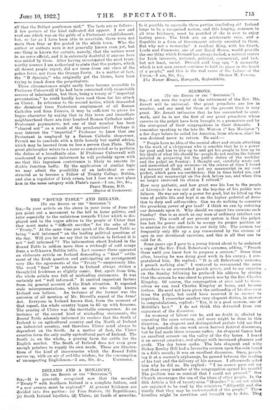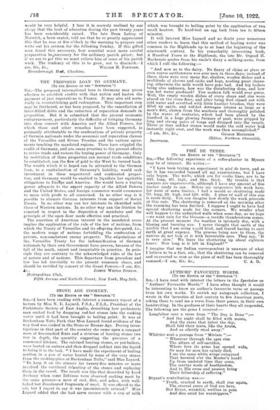SERMONS.
ETo THE EDITOR OF THE " SPECTATOR."] SIR,—I am sure the regret at the retirement of the Rev. Mr. Jowett will be universal. Our great preachers are few in number, and our need for them at the present time is very great. Mr. Jowett intimates that he has succumbed to over- work, and he is not the first of our great preachers whose careers in the pulpit have been brought to a premature end by
the over-greed of their congregations in their demands. I remember speaking to the late Dr. Watson (" Ian Maclaren ") a few days before he sailed for America, from whence, alas! ho was destined never to return. He said:- " People have no idea of the mental effort and strain attaching to the work of a clergyman who is sensible that he is a power for good and has to live up to and get his people to live up to his ideals of what life should be—people do not realize the labour entailed in preparing for the public duties of the weekday and the pulpit on Sunday; I thought out, carefully wrote out and memorized all my sermons—in the course of time I found my memory at fault, and I put my manuscript in my coat pocket, which gave me confidence; this in time failed me, and I placed my manuscript on the desk before me, and when this no longer exercised its charm I retired."
How very pathetic, and how great was his loss to the people of Liverpool– he was cut off in the hey-day of his public use- fulness. Ile was not only a power for good, but he lifted up the tone of public life and kept it on the higher pedestal of devo- tion to duty and self-sacrifice. Can we do nothing to conserve the preaching power of pur land? I think we can by reducing our demands upon it. Why should we expect two sermons each Sunday? One is as much as any man of ordinary intellect can prepare. The result of our present system is that the pulpit has lost its power and fails to occupy its proper position or to exercise its due influence in our daily life. The sermon too frequently only fills up a gap consecrated by the custom of ages in our devotional exercises, and this is all that can be said for it.
Some years ago I gave to a young friend about to be ordained
a copy of the Rev. Fred. Robertson's sermons, adding, " Preach these until you know how to prepare a sermon." Some time after, hearing he was doing good work in his curacy, I con- gratulated him. He replied: " It is all Robertson's sermons, I preach nothing else." I ventured to recommend the same procedure to an overworked parish priest, and to my surprise on the Sunday following he prefaced his address by stating that the sermon he was about to preach was by the Rev. Charles Kingsley. Of course, the congregation at once said to them- selves we can read Charles Kingsley at home, and became listless. He need not have given the authorship of his discourse from the pulpit, but could have reserved it in answer to inquiries. I remember another very eloquent divine, in answer to congratulations, replied: " Yes, it is a good sermon, one of
Melville's best." I do not think this detracted from our enjoyment of the discourse.
An economy of labour can be, and no doubt is, effected by repeating the same sermon, and more might be done in this direction. An eloquent and distinguished prelate told me that he had preached in one week seven harvest festival discourses, but he had made three sermons suffice. An eloquent Canon had an excellent sermon—on the valley of the dry bones. I heard it on several occasions, and always with increased pleasure and profit. The dry bones spoke. The late eloquent and witty Bishop Rowley Hill had a favourite sermon upon the coin found in a fish's mouth; it was an excellent discourse. Once, preach. ing it at a seamen's orphanage, he paused between the reading of his text and the delivery of his sermon. I afterwards asked him why he did so. He replied : " I no sooner gave out my text than every member of the congregation opened his mouth! The position was so comical that I could not proceed." Our Church encourages the use of the ideas of other people. In the 35th Article a list of twenty-nine "Homilies" is set out which are enjoined to be read by the ministers "diligently and dia. tinctly that they may be understanded of the people." These homilies might be rewritten and brought up to date. They
would be very helpful. I fear it is scarcely realized by our clergy that the level of education during the past twenty years has been considerably raised. The late Dean Lefroy of Norwich, a borii orator, told me that he so greatly appreciated this that he rose at five o'clock in the morning to prepare and write out his sermon for the following Sunday. If this gifted man found this necessary, bow essential must more careful preparation beoecessary for the ordinary parish priest; but if we are to get this we must relieve him of some of his parish work. The tendency of this is to grow, not to diminish.-1 am, Sir, &c., Winfed B. FORWOOD. Bromborough Heil, Cheshire.



































 Previous page
Previous page